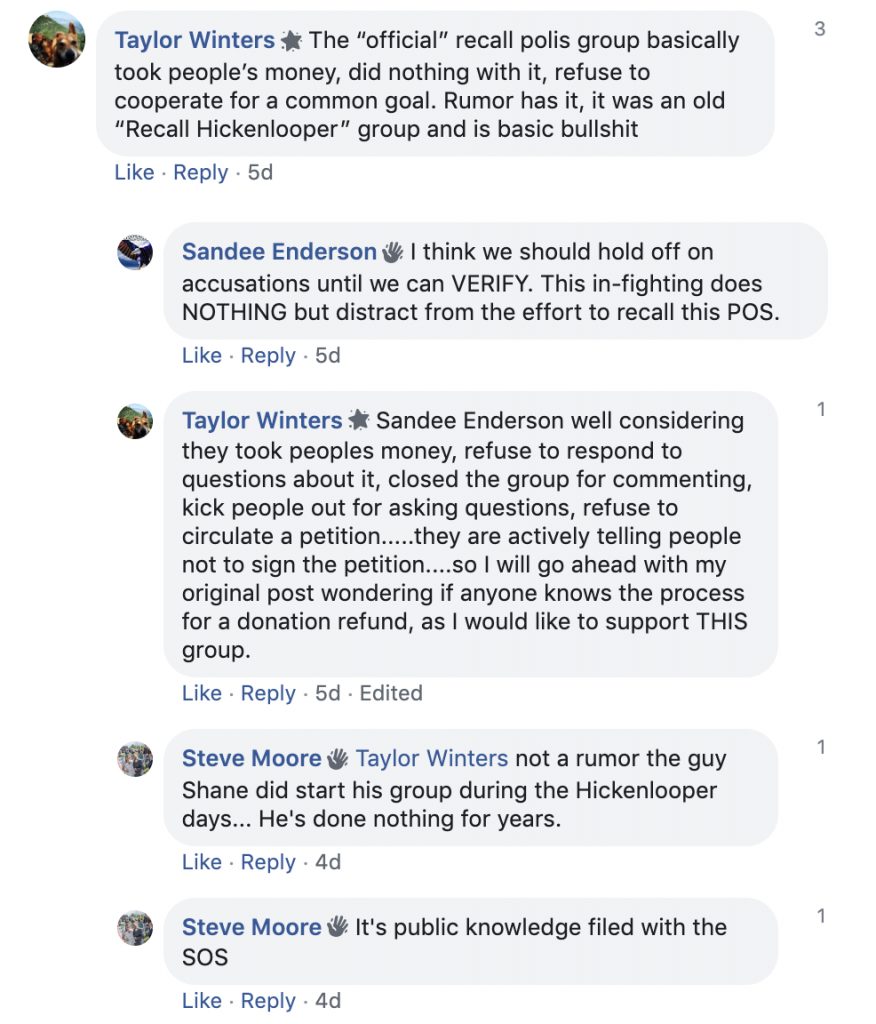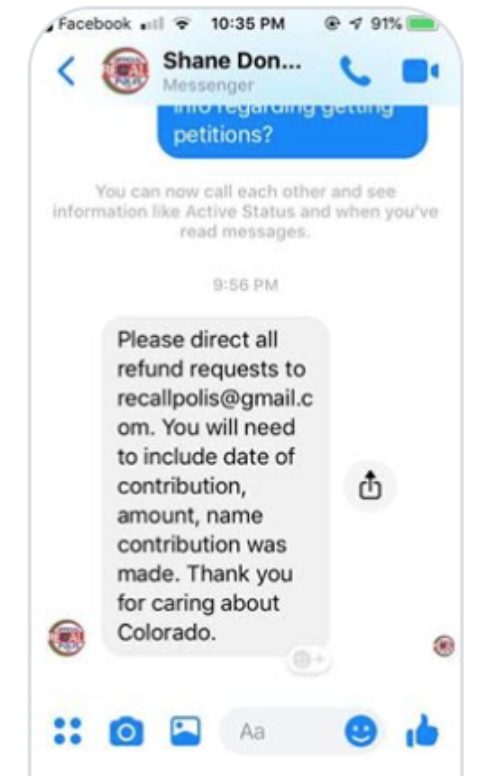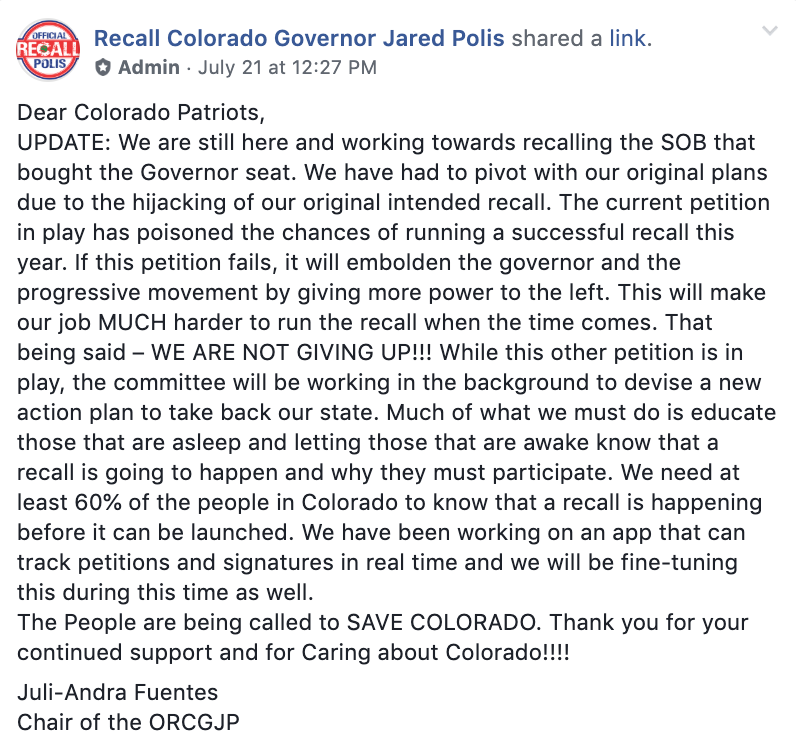Across Colorado, the conservative movement to recall Democratic Gov. Jared Polis has been divided for weeks. Now, supporters of one of the groups promising to remove the governor believe they’ve been cheated out of their donations.
Recall discussions started on social media soon after Polis took office. In the ensuing months, the initial “Recall Polis” effort split into two groups: “Resist Polis PAC Recall” and the “Official Recall Colorado Governor Jared Polis.” The word “official” in the second group’s name doesn’t denote any formal standing. It’s simply what they decided to call themselves.
On July 8, the Resist Polis group filed a recall petition with the Secretary of State and, upon approval, launched a signature gathering effort. Over 631,000 valid signatures from registered Colorado voters must be collected in 60 days to successfully put the gubernatorial recall on the ballot.
“Does anyone know how to get our money back from the fraud group if we donated?” Taylor Winters asked in the Resist Polis PAC Recall Facebook group last week.

Winters, a member of the Resist Polis PAC group, said that Shane Donnelly, who runs the “official” Recall Polis Facebook group, “took people’s money [and] did nothing with it,” before refusing “to cooperate for a common goal” with the rest of the recall movement.
Another commenter accused Donnelly of collecting over $100,000 in donations to support the Polis recall effort and then leaving the state.
Donnelly’s committee has yet to begin its signature drive. The “official” campaign’s board chair told the Colorado Sun last month that it won’t start gathering signatures until it believes it has the resources to succeed. As reported by the Sun’s Sandra Fish:
Juli-Andra Fuentes, who leads the Official Recall committee, confirmed the current situation. She said she estimates it will take at least $4.4 million, and her group won’t initiate the recall process until it has more money, enough volunteers and a candidate to replace Polis.
Since issuing that statement, the Facebook page for Donnelly’s group has gone quiet, even turning off comments on old posts. Now some of his former supporters are asking the Resist group about getting their money back.
The Recall Polis fundraising effort used to be housed in a single Facebook page, but after a dispute between two of the men running it – Shane Donnelly and Tom Good – the fundraising effort was split.
Good started his own page – which everyone in the comment seemed to regard as legitimate – while Donnelly kept control of the “official” page.
It is members of the Resist Polis PAC Recall Facebook group who are complaining.
Both groups had campaign finance complaints filed against them last month, each of which have since been dismissed. It does not appear that any of the Resist Polis PAC members who want their previous donations to the “official” recall group returned to them has filed a complaint with the Secretary of State’s office against Donnelly’s group yet.

Secretary of State spokesperson Serena Woods says the office hasn’t received any formal complaints regarding recall groups beyond the two that have already been dismissed. \
“We encourage anyone who has concerns to file a complaint with our office, which will allow our campaign finance team to look into any committee activity that isn’t above board,” said Woods.
Woods also directed people to TRACER, the SOS public campaign finance disclosure database.
“Anyone who wants to give money to a campaign, can go to TRACER to look up the entity that’s asking for money,” Woods explained. “There, you can see the committee’s purpose, leadership and what it’s spending its money on.”
Some commenters cautioned against making public accusations of fraud without presenting evidence.
“I think we should hold off on accusations until we can VERIFY,” one commenter said. “This in-fighting does NOTHING but distract from the effort to recall this POS.”

Winters messaged Donnelly’s personal Facebook, receiving a reply with what looked like a generic response containing directions for filing a refund.


A Facebook message sent to Donnelley’s personal account seeking comment was not returned.
Other refund-seeking donors say they have been blocked by the page in question.
Although this most recent recall movement is relatively fresh for most Colorado Republicans, Donnelly’s Facebook page is not. First created in 2014, it was renamed three years later with the intent of recalling then-Gov. John Hickenlooper, a Democrat. It wasn’t changed to “Recall Colorado Governor Jared Polis” until February of this year. A month later, a Greeley Tribune reporter found posts by page administrators that were anti-Semitic, if not outright sympathetic to Nazism.
With the page essentially inactive since its last post on July 21, former supporters are left wondering whether their donations were well-spent.
In that final post, board chair Juli-Andra Fuentes insisted the effort is still ongoing and blamed the Resist Polis PAC for “hijacking” the recall and “poisoning” its chances of success.

A page administrator turned off comments on the post. Since then the vast majority of recall conversations are taking place on the Resist Polis PAC pages.
Steve Moore, a Mesa County Republican and conservative activist, had more insight.
“I think everyone has a valid right to question them,” he said, “although I don’t think you will find answers.”

Moore encouraged people “to go after the board,” but told them to “tread lightly” as to avoid alienating the group’s thousands of followers.
“The board is a joke but the members are very good people,” he said. “Continue to get the recall message out and be willing to attract those members.”
Ultimately, it seems unlikely that unhappy donors will receive refunds, a conclusion summarized by commenter Nancy Pallozzi, a former candidate for Colorado House District 28 in Lakewood who is heavily involved in the active recall movement:
“By law you can ask for your money back.” saod Pallozzi on Facebook. “Whether you get it, is another thing.”

Erik Maulbetsch contributed to this post.





